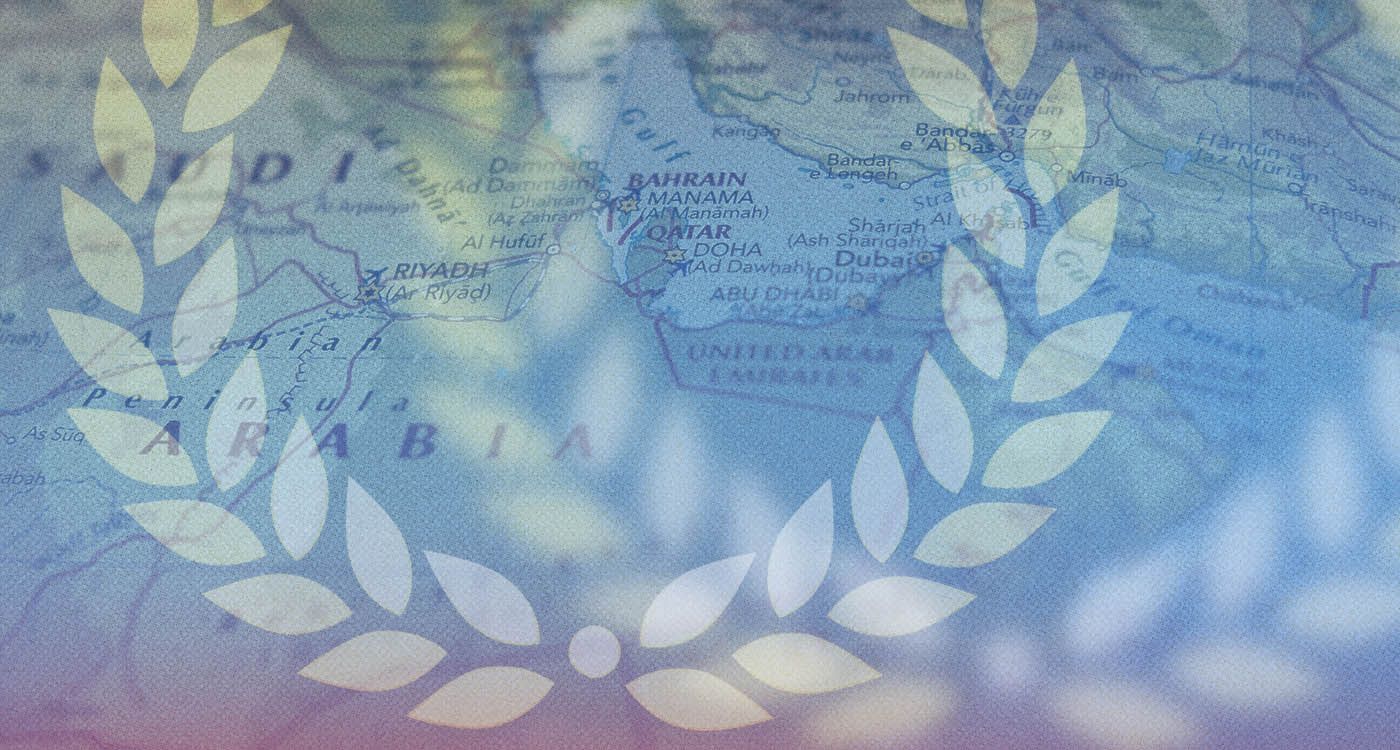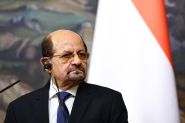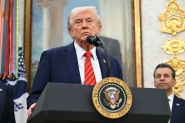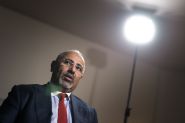- Home
- Middle East
- From Iran’s Nuclear Program to Gaza: The Gulf as the New Hub of Global Diplomacy (1/2)

©This is Beirut
As negotiations to end the Israel-Hamas war resume and talks over Iran’s nuclear program continue, the Gulf states are attracting unprecedented international diplomatic attention. From Muscat to Doha, and from Riyadh to Abu Dhabi, the contours of the Gulf’s growing prominence are taking shape.
On December 8, 2024, the Secretary-General of the Gulf Cooperation Council (GCC) stated that the member states of the GCC “are committed to strengthening dialogue and diplomacy, ensuring that the Gulf region remains a hub for peace and cooperation amid growing global competition.” This was said during a roundtable on the future of cooperative security in regional stability, held at the 22nd Doha Forum in Qatar.
Four months later, the Gulf states appear to have fully embraced these recommendations. While negotiations between the Iranians and Americans continue in Oman, Qatar has positioned itself, alongside Egypt, as the key mediator in the ongoing Israel-Hamas war.
Saudi Arabia, the key force within the organization, has emerged as the favored mediator in efforts to resolve the Ukraine conflict. Meanwhile, the United Arab Emirates has similarly stepped up, playing a significant role in addressing the Iranian, Ukrainian and Syrian crises.
This shift is part of a broader, long-term trend. Since the beginning of the 21st century, these states have steadily positioned themselves as more active players on the global diplomatic stage.
Oman: A Forefront Player
Oman remains the Gulf’s undisputed diplomatic frontrunner. Its mediation policy began to take shape after the rise to power of Sultan Qaboos bin Said in 1970, who profoundly modernized the country. This process started during the Iran-Iraq War, when Muscat was one of the few Arab capitals to maintain relations with both sides, encouraging dialogue.
Oman later played a key role in the successive crises that affected Yemen, facilitating contacts between rival factions. Between 2000 and 2010, the Omani government assisted in the release of Western hostages in the region, including three Americans detained in Iran. Finally, it worked to ease tensions in the Gulf, maintaining neutrality during the Qatar blockade from 2017 to 2021.
After 50 years of rule, Sultan Qaboos passed away in 2020. His cousin, Haitham bin Tariq, succeeded him, maintaining the same approach: unwavering neutrality, discretion and balanced relations with often conflicting powers such as Iran, the United States, Saudi Arabia and even Bashar al-Assad’s Syria, with which Oman never severed ties.
In March 2023, Oman played a pivotal role in the reconciliation between Iran and Saudi Arabia, backing China’s diplomatic efforts in the process. Moreover, Oman remains open to communication with Israel, while conditioning its recognition on the establishment of a Palestinian state.
These factors have helped Muscat build a solid reputation as a mediator, especially regarding the Iranian nuclear issue. The negotiations leading to the Joint Comprehensive Plan of Action (JCPOA), which was signed in 2015 under former US President Barack Obama, were notably facilitated through Oman. It therefore comes as no surprise that the Sultanate has once again assumed this key role.
‘Speaking to Everyone for the Good of All’
Oman’s Foreign Minister, Badr bin Hamad Albusaidi, summed up the country’s diplomatic policy with the phrase “speaking to everyone for the good of all,” during a talk at Oxford’s Centre for Islamic Studies on February 16.
That policy is driven by several factors – starting with geography. Oman lies at the mouth of the Strait of Hormuz, a vital corridor through which a third of the world’s liquefied natural gas and nearly a quarter of global oil consumption flows, according to the US Department of Energy.
More importantly, the Sultanate controls the exclave of Musandam, at the northern tip of the peninsula of the same name, where the Strait of Hormuz narrows across from the Iranian coast – effectively giving Oman control over this critical maritime passage. The area’s strategic importance is bolstered by a substantial Omani military presence and strong US security backing.
This geography also positions Muscat as a natural crossroads. Oman has long stood at the intersection of trade routes connecting East Africa, India, Iran and the Arabian Peninsula. Even before the rise of Sultan Qaboos, this allowed the country to build diplomatic, economic and cultural ties with a broad array of partners.
Finally, there is the country’s distinct religious identity. Oman’s population is predominantly Ibadi – a branch of Islam that differs from both Sunni and Shia traditions. This has allowed the Sultanate to steer clear of the region’s sectarian divides and position itself as a neutral mediator between Sunni and Shia actors.
Qatar: At the Center of the Action
In stark contrast to Oman’s quiet diplomacy, Qatar has built a reputation for highly active engagement on the world stage. Its diplomatic push began in 1995, when Sheikh Hamad bin Khalifa Al Thani came to power and overhauled the country’s foreign policy apparatus, leveraging Doha’s immense offshore gas wealth.
Qatar quickly asserted itself by strengthening security ties – most notably with Washington – and expanding its soft power with the launch of al-Jazeera in 1996. At the same time, it maintained strong relations with neighboring Iran, with which it shares the world’s largest natural gas field. Much like Oman, Qatar allowed Israel to open a diplomatic office in Doha in 1996, though it refrained from formally recognizing the Israeli state.
These factors have enabled Qatar to position itself as a key player in mediation. Its diplomatic engagement began in the 2000s, notably in the crises in Yemen and Sudan, and more significantly in Lebanon. When Hezbollah seized control of Beirut on May 7, 2008, the Emirate played a pivotal role in resolving the crisis. During the Arab Spring uprisings of 2011, Doha actively supported the revolts, particularly those aligned with the Muslim Brotherhood.
However, this approach has drawn the ire of its neighbors, particularly Saudi Arabia. Riyadh, seeking to rally GCC members around its positions, viewed Qatar’s diplomatic autonomy and its ties with the Brotherhood with suspicion. As a result, it imposed a blockade on Doha, with the support of the UAE, Bahrain and Egypt.
Doha: A Resilient Approach
In the face of challenges, Qatar has shown remarkable resilience, using these pressures to its advantage. The Emirate has strengthened its relationships with regional powers like Turkey and Iran, while also reinforcing its strategic ties with global players such as France and, notably, the US, where it has become a key mediator in negotiations with Afghanistan’s Taliban.
In addition to expanding its diplomatic ties and leveraging its resources, Qatar’s resilience is also deeply rooted in its internal structure. With a population of around 200,000 across 11,000 km², the Emirate benefits from a unique advantage. It has established an “implicit” social contract in which citizens, in exchange for their loyalty to the ruling power, enjoy significant social benefits funded by the substantial revenues from its gas industry.
Since the 2017 crisis, this arrangement has evolved into a strong sense of national unity behind Emir Al Thani. With the threat of social unrest effectively removed, the petromonarchy is now positioned to focus on long-term goals. This consolidation of internal leadership has reinforced the legitimacy of its foreign policy, including its proactive and at times bold diplomatic approach.
Today, Qatar has become a leading player, alongside Egypt, in efforts to mediate a ceasefire in Gaza. The primary reason for its prominent role lies in the fact that, in addition to hosting an Israeli representation, Doha is also home to Hamas’ political office, which it has financially supported in the past. However, the Emirate no longer operates unilaterally; it now coordinates closely with other regional powers, such as Cairo. This shift highlights the point made by researcher Karim Sader in a November 2024 interview with This Is Beirut: “Qatar can no longer operate unilaterally without facing constraints.”
As a result, while Muscat and Doha continue to assert their positions on the regional diplomatic stage, both capitals now face growing competition from their neighbors, particularly the UAE and, more importantly, the powerful Saudi Arabia. Each of these countries has its own distinctive characteristics, which we will explore in a subsequent article.
Read more




Comments